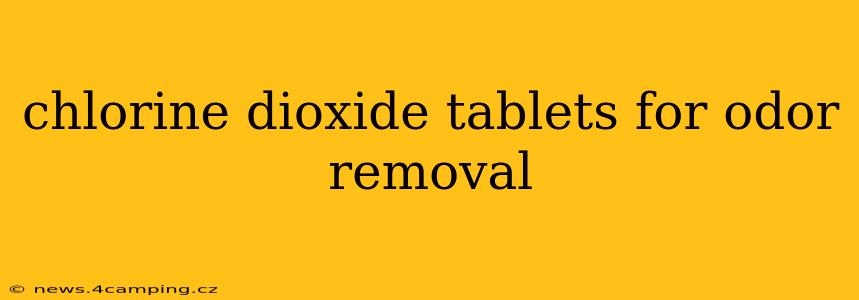Chlorine dioxide (ClO2) is a powerful oxidizing agent increasingly used for odor removal in various settings. Unlike chlorine bleach, it's effective at lower concentrations and doesn't produce harmful chlorinated byproducts. This guide explores its applications, effectiveness, and safety precautions when using chlorine dioxide tablets for odor removal.
What are Chlorine Dioxide Tablets Used For?
Chlorine dioxide tablets are primarily used for odor control and disinfection. Their applications span a wide range, including:
- Water Treatment: Removing unpleasant tastes and odors from drinking water.
- Air Purification: Neutralizing unpleasant smells in enclosed spaces like homes, offices, and vehicles.
- Surface Disinfection: Eliminating bacteria and viruses on various surfaces.
- Industrial Applications: Treating wastewater and industrial effluents.
How Effective are Chlorine Dioxide Tablets for Odor Removal?
The effectiveness of chlorine dioxide tablets for odor removal depends on several factors, including:
- The type and source of the odor: ClO2 is highly effective against many organic odors but may be less effective against inorganic odors.
- The concentration of ClO2: Higher concentrations generally lead to better results but require careful handling.
- Exposure time: Sufficient contact time between ClO2 and the odor source is crucial for effective neutralization.
- Environmental conditions: Temperature and humidity can influence the effectiveness of ClO2.
Chlorine dioxide oxidizes odor-causing molecules, breaking them down into less odorous compounds. This process effectively neutralizes a wide range of smells, including those from mold, mildew, smoke, pet odors, and sewage.
What are the Safety Precautions When Using Chlorine Dioxide Tablets?
While effective, chlorine dioxide requires careful handling:
- Always follow the manufacturer's instructions: Dosage and application methods vary depending on the product and intended use.
- Wear appropriate protective gear: Gloves, eye protection, and a respirator are recommended, especially when working with higher concentrations.
- Ensure adequate ventilation: Chlorine dioxide gas can be irritating to the respiratory system.
- Avoid contact with skin and eyes: Immediate flushing with water is necessary if contact occurs.
- Store tablets in a cool, dry place, away from children and pets: Improper storage can lead to degradation and potential hazards.
Are Chlorine Dioxide Tablets Safe for Use Around Pets and Children?
While chlorine dioxide is effective in eliminating odors, it's crucial to prioritize safety when using it around pets and children. Always follow the manufacturer's instructions precisely, ensuring the area is well-ventilated after treatment. Once the application is complete and the area has been thoroughly aired, it should be safe for pets and children. However, if you have concerns, consult a veterinarian or pediatrician.
How Do Chlorine Dioxide Tablets Compare to Other Odor Removal Methods?
Compared to other odor removal methods like air fresheners or ozone generators, chlorine dioxide offers several advantages:
- Effective odor neutralization: It doesn't just mask odors; it breaks down the odor-causing molecules.
- Broad-spectrum effectiveness: It's effective against a wide range of odors.
- Disinfectant properties: It also disinfects surfaces, killing bacteria and viruses.
However, chlorine dioxide requires careful handling and may not be suitable for all situations.
Can Chlorine Dioxide Tablets Remove Mold Odor?
Yes, chlorine dioxide tablets are effective in removing mold odor. The oxidizing properties of chlorine dioxide break down the volatile organic compounds (VOCs) released by mold, eliminating the unpleasant smell. However, remember that removing the mold odor doesn't necessarily eliminate the mold itself; addressing the mold source is crucial to prevent recurrence.
What are the Potential Side Effects of Using Chlorine Dioxide Tablets?
At appropriate concentrations and with proper ventilation, the side effects are usually minimal. However, high concentrations or poor ventilation can lead to respiratory irritation, such as coughing and shortness of breath. Skin and eye irritation are also possible if direct contact occurs. Always follow safety precautions and manufacturer instructions to minimize risks.
This information is for general knowledge and informational purposes only, and does not constitute medical or professional advice. Always consult with a professional for specific advice related to your situation.
